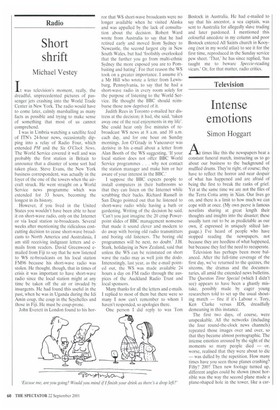Radio
Short shrift
Michael Vestey
It was television's moment, really, the dreadful, unprecedented pictures of passenger jets crashing into the World Trade Center in New York. The radio would have to come later, calmly marshalling as many facts as possible and trying to make sense of something that most of us cannot comprehend.
I was in Umbria watching a satellite feed of ITN's 24-hour news, occasionally dipping into a relay of Radio Four, which extended PM and the Six O'Clock News. The World Service covered it well and was probably the first station in Britain to announce that a disaster of some sort had taken place. Steve Evans, the New York business correspondent, was actually in the foyer of the one of the towers when the aircraft struck. He went straight on a World Service news programme which was extended for 33 hours, becoming the longest in its history.
However, if you lived in the United States you wouldn't have been able to hear it on short-wave radio, only on the Internet or via local station re-broadcasts. Several weeks after mentioning the ridiculous costcutting decision to cease short-wave broadcasts to North America and Australasia, I am still receiving indignant letters and emails from readers. David Greenwood emailed from Fiji to say that he now listened to WS re-broadcasts on his local station FM96 because his short-wave radio was stolen. He thought, though, that in times of crisis it was important to have short-wave radio since the local station might at any time be taken off the air or invaded by insurgents. He had found this useful in the past, when he was in Uganda during the Idi Amin coup, the coup in the Seychelles and those in Fiji. He must be coup-prone.
John Everett in London found to his hor
ror that WS short-wave broadcasts were no longer available when he visited Alaska and was appalled by the lack of consultation about the decision. Robert Ward wrote from Australia to say that he had retired early and moved from Sydney to Newcastle, the second largest city in New South Wales, but had 'foolishly overlooked that the further you go from multi-ethnic Sydney the more exposed you are to Pornbaiting and hating'. For that reason the WS took on a greater importance. I assume it's a Mr Hill who wrote a letter from Lewisburg, Pennsylvania, to say that he had a short-wave radio in every room solely for the purpose of listening to the World Service. He thought the BBC should reimburse those now deprived of it.
Judith Rees in Toronto e-mailed her distress at the decision; it had, she said, 'taken away one of the real enjoyments in my life'. She could hear only five minutes of rebroadcast WS news at 8 a.m. and 10 a.m. each day, and for one hour on Sunday mornings. Jon O'Grady in Vancouver was derisive in his e-mail about a letter from Alan Booth of the WS suggesting, 'If your local station does not offer BBC World Service programmes . . . why not contact the station manager and make him or her aware of your interest in the BBC.'
I suppose the BBC expects people to install computers in their bathrooms so that they can listen on the Internet while scrubbing their backs. Richard Russell in San Diego pointed out that he listened to short-wave radio while having a bath or gardening. Writing of the decision he said, 'Can't you just imagine the 20 crisp Powerpoint slides of BBC management nonsense that made it sound clever and modern to do away with boring old radio transmitters and boring old listeners. The boring old programmes will be next, no doubt.' J.H. Stark, holidaying in New Zealand, said that unless the WS can be reinstated on short wave the radio may as well join the dodo. Interestingly, last year, as the e-mail pointed out, the WS was made available 24 hours a day on FM radio through the auspices of the Auckland Radio Trust and local sponsors.
Many thanks for all the letters and e-mails. I replied to most of them but there were so many I now can't remember to whom I haven't responded, so apologies there.
One person I did reply to was Tom Bostock in Australia. He had e-mailed to say that his ancestor, a sea captain, was sent to Australia for allegedly slave trading and later pardoned. I mentioned this colourful anecdote in my column and poor Bostock entered All Saints church in Kooyong (not in my world atlas) to see it for the first time, reproduced in the Sunday service pew sheet. 'That,' he has since replied, 'has taught me to beware Speccie-reading vicars.' Or, for that matter, radio critics.










































































 Previous page
Previous page